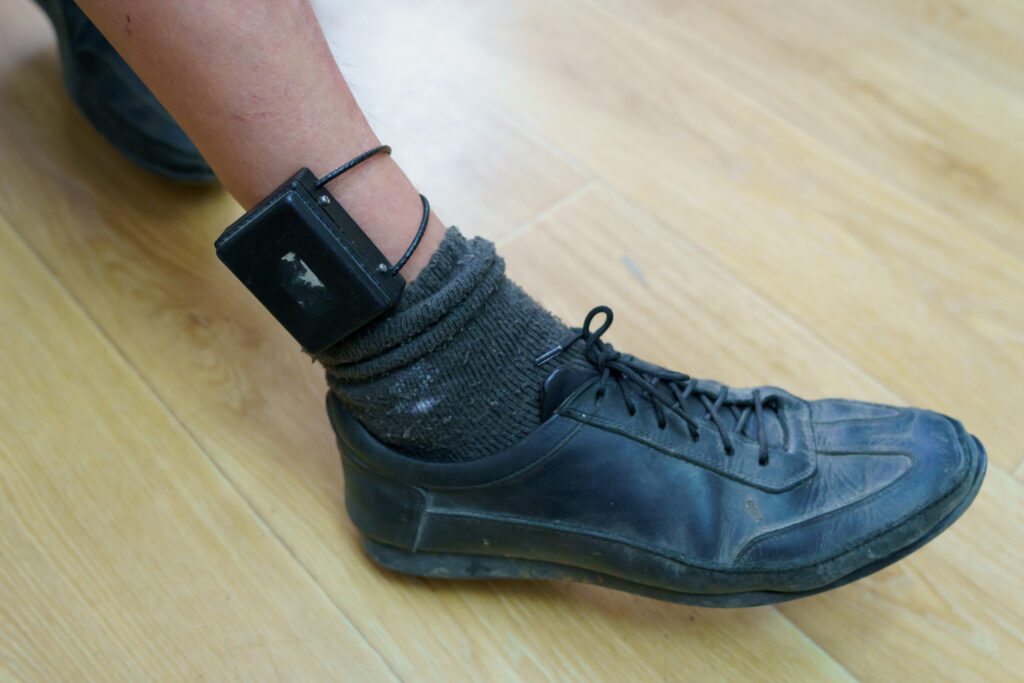Overcrowding of our nation’s jails and prisons has been a major topic of conversation for more than two decades. Part of the efforts to reduce the number of people incarcerated in short- and long-term detention facilities has been the introduction and expansion of electronic monitoring options.
These electronic monitors, usually in the form of an ankle bracelet, allow certain defendants and those convicted of crimes to continue to live at home, work, attend worship services, and more while awaiting trial or serving on parole.
Electronic monitoring is used in a wide variety of situations in the Georgia legal system, but the most common are:
- Pretrial release electronic monitoring
- Parole electronic monitoring
- Probation electronic monitoring
- Alcohol electronic monitoring
In this article, we’ll focus on pretrial release monitoring, but monitoring in other circumstances works much the same way.
What Does an Ankle Monitor Do?
A GPS ankle monitor straps to the defendant’s ankle with a tamper-resistant strap. It continually monitors the defendant’s location and sends that information to the monitoring company managing that individual’s monitoring. Law enforcement can request any defendant’s location from the monitoring company at any time.
Monitors may also enforce boundaries and curfews. If the conditions of a defendant’s release require that they avoid certain places or stay in certain areas, the ankle monitor will provide an aural warning if they’re about to enter a restricted area. If the release conditions require the defendant to be home by a specific time, the monitor will alert them if they violate their curfew.
Who Is Eligible for Pretrial Release Monitoring?
When someone is arrested, they may have multiple options for securing their release while they await trial. If bail is set, they can bail themselves or secure a release through a bail bond service. If the court determines that the situation and the nature of the alleged offense warrant an electronic monitoring option, that may also be offered.
Note that the offer of a monitored pretrial release is entirely up to the court’s discretion. Those accused of violent or sexual offenses or who are considered a flight risk or repeat offender may not be eligible for pretrial release monitoring. The court may also revoke a defendant’s monitored pretrial release at any time.
Who Pays for Ankle Monitoring?
Usually, the person being monitored pays for the monitoring service. The monitored individual is also responsible for keeping the ankle monitor charged, keeping it from being damaged, and preventing it from being submerged in water. Intentionally failing to charge or damaging an ankle monitor is a significant violation and may result in additional criminal charges, fees, and damages.
How Does Ankle Monitoring Work?
- First, the defendant’s family, attorneys, a law enforcement officer, or a court officer will contact an eligible and authorized ankle monitoring service.
- The service will discuss the situation with the defendant, determine the correct type of monitoring for the circumstances, and make recommendations.
- The court will provide the appropriate documents to the monitoring company to specify the exact services, any geographic limitations that must be imposed, and authorizing the monitoring.
- The monitoring service and the court coordinate the ankle monitor installation, and the defendant signs the monitoring agreement when the device is installed.
Once the device has been installed, the monitoring begins. While the defendant is wearing the monitor, they are free to move about within the court-approved area. If they violate the terms of their release, their monitor will notify them with a notification, either an alarm or a voice notification from the monitoring company.
Once the defendant’s trial has concluded, their pretrial monitoring is terminated. If the defendant is sentenced to a monitored probation or house arrest, a new monitoring agreement must be signed to allow the company to continue monitoring the individual post-conviction. The monitor will be removed once the sentence is complete, if the defendant is acquitted, or if they are convicted and sentenced to prison.
Arrested in Macon-Bibb County? Don’t Wait in Jail; Call All State Bonding: 478-745-1966
All State Bonding is located directly across the street from the Bibb County Jail in downtown Macon. We’re available 24/7, and all our bonding decisions are made on-site, so you never have to wait for an answer.
